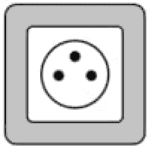Plug For Democratic Republic of Congo: What You Need To Know
What is the plug for Democratic Republic of Congo? Before you travel, check the information below to make sure your electronic devices are compatible with the outlet type and voltage.
Electrical Summary
Democratic Republic of Congo (DRC) uses outlet types C, D, E at a voltage of 220V and a frequency of 50 Hz.
Plug Compatibility: Type C, Type D, Type E
Voltage: 220V
Frequency: 50 Hz
Type C

Type D

Type E

Can North Americans use Electronics in Democratic Republic of Congo without an Adapter?
No! North Americans will need an adapter for the outlets and a transformer for the voltage when traveling to Democratic Republic of Congo. North Americans device plugs will not work with the outlet types in Democratic Republic of Congo. Also, the voltage in Democratic Republic of Congo is different from North American voltages.
Can Europeans use Electronics in Democratic Republic of Congo without an adapter?
Yes! Most Europeans do not need a travel adapter or transformer when traveling to Democratic Republic of Congo. Most device plugs will work with the outlet types in Democratic Republic of Congo. Also, the voltage in Democratic Republic of Congo is the same as in Europe.
What Outlet does Democratic Republic of Congo Use?
Type C

Type D

Type C plug sockets have two round pins and no grounding pin. These plugs are typically used with devices that have a voltage of 230V.
Type D plug sockets have three round pins and a grounding pin. These plugs are typically used with devices that have a voltage of 230V.
Type E

Type E plug sockets have two round pins and a grounding pin. These plugs are typically used with devices that have a voltage of 230V.
Is it safe to drink water in Democratic Republic of Congo?
To be on the safe side, you can use common precautions such as boiling tap water for at least one minute, using water purification tablets, or drinking bottled water. It’s also important to note that ice may be made from tap water and that foods may be washed or prepared with tap water.
We recommend always packing a filtered water bottle when traveling:
Travel Essentials
Be sure to check our list of travel essentials before your trip!
Should I get travel insurance when traveling to Democratic Republic of Congo?
It is generally recommended to get travel insurance when traveling to a different country. Travel insurance can provide financial protection and peace of mind in case of unexpected events, such as medical emergencies, trip cancellations, lost or stolen baggage, or other travel-related mishaps.
Travel insurance can cover various expenses related to your trip, such as medical expenses, emergency medical transportation, trip cancellation or interruption, lost or stolen baggage or personal belongings, and other travel-related expenses.
Before purchasing travel insurance, it’s important to carefully review the policy details, including the coverage limits, exclusions, and any applicable deductibles or copays. You should also make sure that the policy covers any activities or destinations that you plan to participate in or visit during your trip.
Travel Summary
One of the most popular destinations in DRC is Virunga National Park, a UNESCO World Heritage Site that is home to a diverse range of wildlife, including gorillas, elephants, and hippos. Visitors can go on guided safaris to observe these animals in their natural habitat, or go trekking to explore the stunning landscapes of the park, including active volcanoes, dense forests, and scenic lakes.
Another popular destination in DRC is the city of Kinshasa, the capital of the country, which is known for its vibrant culture, lively nightlife, and delicious food. Visitors can explore the city’s historic landmarks, such as the National Museum of Congo and the Palais de la Nation, or sample its local cuisine, which features a mix of African, French, and Belgian influences.
DRC is also home to several other natural attractions, such as the Congo River, the second-longest river in Africa, and the Kabila Falls, a stunning waterfall that is located in the southeastern part of the country.
However, travel to DRC can be challenging due to safety concerns and the country’s infrastructure. Visitors should exercise caution and stay informed about the situation in the country, especially in areas affected by conflict. It is recommended to travel with a reputable tour operator and to follow the advice of local authorities.
In conclusion, DRC offers a unique and unforgettable travel experience for visitors who are interested in exploring its stunning natural beauty, rich cultural heritage, and diverse wildlife. However, visitors should be aware of the challenges of traveling to a country with safety concerns and limited infrastructure, and should take necessary precautions to ensure their safety.
Traveling to another country? Check out our Countries page for more info.